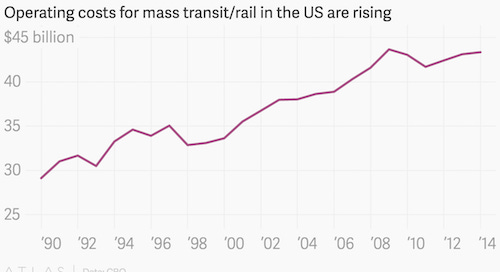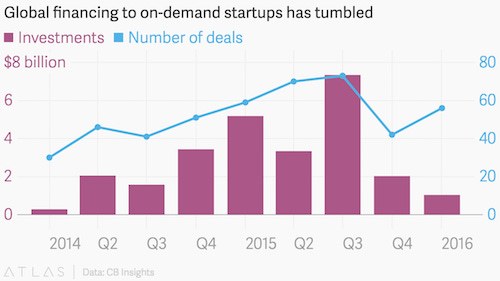Public-private transit.
In 2015 Uber quietly installed its ride-hailing rules across America; this year it’s doing the same with public transit partnerships. Uber is testing some form of locally subsidized rides in cities including San Francisco, Philadelphia, Pittsburgh, Atlanta, Cincinnati, and Dallas. Here is a Bloomberg story on a partnership Uber is running in Pinellas Park, Florida (riders will receive 50% discounts of up to $3 on trips to local transit hubs; the city says it will cost $40,000 a year) and here is a piece from the Verge on a similar Uber program in another suburban Florida city, Altamonte Springs.
Moving into mass transit should in theory help Uber cut its massive cash burn in the US. Both Uber and Lyft are spending tens of millions of dollars a month in US cities to keep fares low, new users coming in, and old ones sticking around. Those costs are high even for a company as richly funded as Uber, and who better than public transit agencies to start absorbing them? In 2014, Americans spent at least $15 billion on public transportation and transit agencies $42 billion, much of which went to subsidies. Imagine if even a fraction of that were diverted to ride-hailing companies. Becoming the dedicated “first” and “last” mile transit option for commuters—i.e., what gets you from home or work to the closest metro station—would increase Uber’s brand awareness and lock in its customers. It would also help Uber expand beyond dense urban areas and into smaller cities and suburbs.
For cities, integrating ride-hailing into the transit infrastructure could be a solution to urban sprawl, and a cheaper alternative to replacing outdated or defunct systems. In March, the American Public Transportation Association recommended that agencies “recognize ridesourcing as part of the new urban fabric and an opportunity to extend and expand the use of public transit, such as first/last mile connections.” But the Verge suggests there’s also reason to be wary:
Uber’s penchant for secrecy can put it at odds with conventions of government transparency. In other cities, the company has convinced regulators to allow it to hide its ridership data—Uber’s agreement with Boston requires the city to keep Uber’s ridership data under wraps, even stipulating that the company will pay the city’s litigation costs in a fight to keep that data confidential. In San Francisco, data that Lyft or Uber gives the city is under seal and thus reportedly hidden—even from city transportation planners.
Says the city planner leading Uber’s partnership in Altamonte Springs, “Sometimes the thing that matters most is moving people, not being able to find every piece of paper.”
All washed up.
Uber-for-laundry startup Washio became the latest addition to the Uber-for-X graveyard when it shut down last week. Washio entered the frothy on-demand laundry scene in 2013 and within a year had at least half a dozen competitors. That was when funding flowed freely and startups like Washio attracted customers with discounts, subsidies, and gourmet cookies delivered alongside your freshly laundered clothes. (For more on the cookies, see Jessica Pressler’s “Let’s, Like, Demolish Laundry,” one of my all-time favorite profiles of on-demand mania and Silicon Valley excess.) Fast-forward a few years and a drop-off in funding has made that model impossible for all but the wealthiest on-demand startups. It’s not surprising that Washio, which was never really more than an expensive middleman, needed to fold. Its death note to users is titled “The Last Cookie.”
Transparency reports.
Airbnb released its first ever “transparency report” last week, which is a bunch of numbers on how it responded to requests for user data from law enforcement in the first half of 2016. For instance, Airbnb received 188 inquires from law enforcement globally from Jan. 1 to June 30, of which it had to disclose user data in 82. The most requests came from France, followed by the US, Germany, and the UK. I am endlessly entertained by the tech industry’s use of the phrase “transparency report” which loosely translates to “please be aware of and indignant about all the data that the government is demanding from us.” Google and Apple have been big on transparency reports for a few years, and Uber released a rather aggressive one this spring. To be fair, it’s good to let the public know these things, but for companies that have so much data on their users and can be so secretive and opaque about it, disclosing 188 request from law enforcement is a weird thing to brand as “transparency.”
Ask Bill Gurley.
Here is a Q&A with venture capitalist and unicorn doomsayer Bill Gurley. It covers Trump and irrational exuberance and Uber and Marc Andreessen, so basically a bit of everything. Gurley won’t say outright that we are in a tech bubble, but notes that we are “in a risk bubble” which “may be different from a valuation bubble.” I particularly liked his answer to the very first question (What are the most overhyped sectors in tech?) and would love to see it turned into a New Yorker cartoon: “Every time Silicon Valley evolves to be looser and more aggressive, our community becomes excited about companies with more inferior unit economics … It is easy to create the illusion of success by selling $1’s for 85 cents. And people celebrate revenue growth, right up until the whole thing comes crashing down. Unit economics are like gravity.”
Other stuff.
Uber Charged Man $500 for a Ride He Never Took. The Plan to Make Self-Driving Cars Speak Human. China investigates Uber-Didi deal. First fully electric Uber fleet launches in London. Uber poaches Jeff Jones. The People Who Matter at Uber. Judge rejects another Uber settlement. PUC refuses to reconsider $11.4 million fine against Uber. Otto sued for trademark infringement. Google pushes deeper into ride-hailing. New York drops English exam for taxi drivers. Uber fights English test in London. California seeks tighter ride-hailing rules. Amazon food delivery heads to Houston. Instacart expands in Atlanta. Kim and Kanye do Airbnb. Check it out on Instagram. Uber bans Kendall Jenner? Lyft gives her free rides. The Man in Charge of Silicon Valley’s Water Cooler. The CIA’s VC firm. Uber and the L train. “The elimination of the driver will mean the end of the car as a car.”





